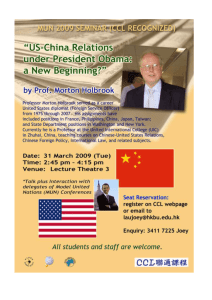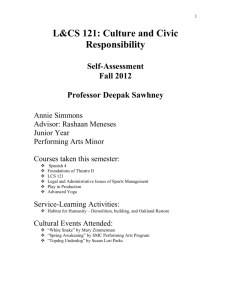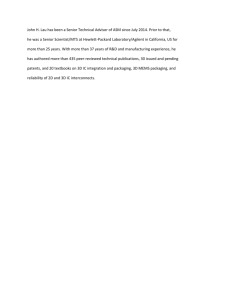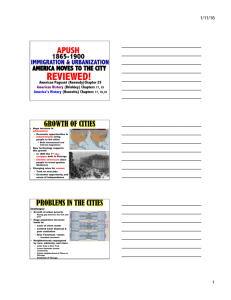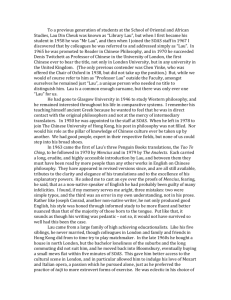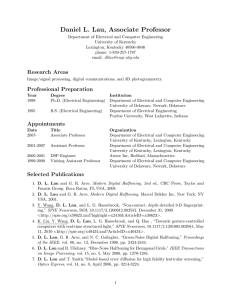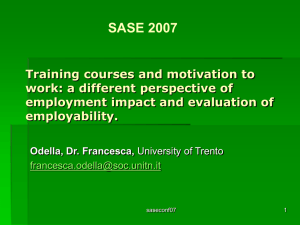Self Assessment L&CS 121
advertisement
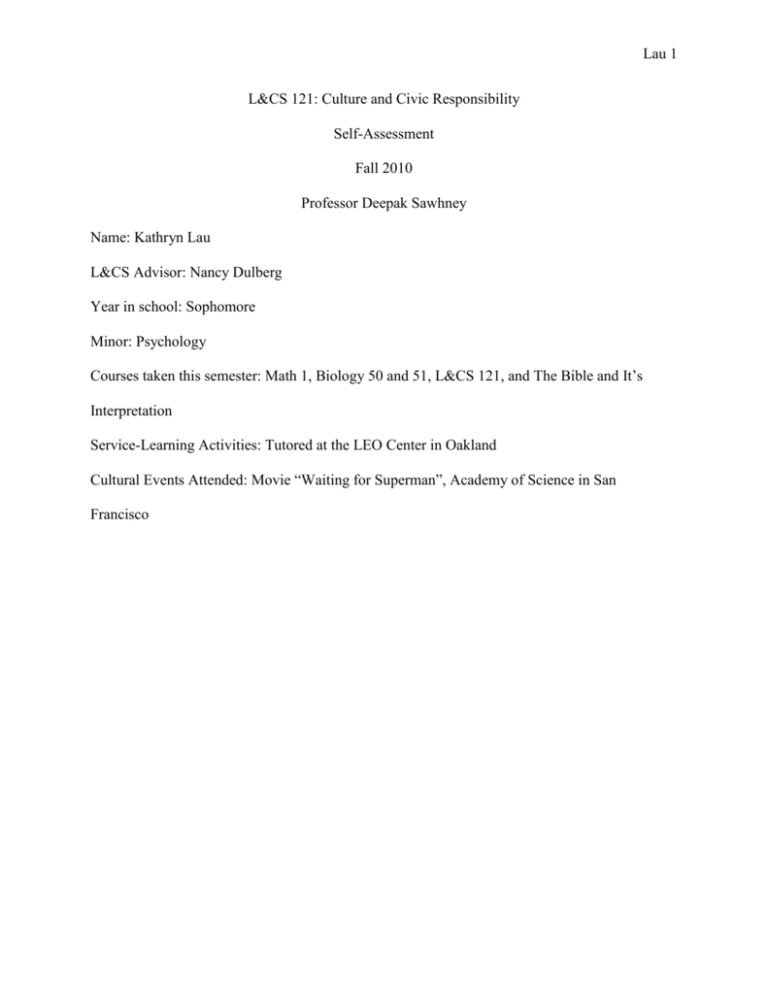
Lau 1 L&CS 121: Culture and Civic Responsibility Self-Assessment Fall 2010 Professor Deepak Sawhney Name: Kathryn Lau L&CS Advisor: Nancy Dulberg Year in school: Sophomore Minor: Psychology Courses taken this semester: Math 1, Biology 50 and 51, L&CS 121, and The Bible and It’s Interpretation Service-Learning Activities: Tutored at the LEO Center in Oakland Cultural Events Attended: Movie “Waiting for Superman”, Academy of Science in San Francisco Lau 2 During the discussions in this year’s L&CS class, I have learned so much about the world around me. I would say that my worldview has been more formed than changed. I am more aware of how important I am as an individual and how I can make a difference. When reading the articles in Rereading America and The Shame of the Nation by Jonathan Kozol, I learned a lot about the education system and about low-income areas and schools. I have always appreciated my education, however, it was never something I struggled with or thought about everyday. Kozol wrote realistically about apartheid schools in America and how the education system is the shame of the nation. He discussed topics like race and income and how they affect the education of children. All my life I have wanted to be an elementary school teacher. It was always so appealing to me. I love children, and I want to educate them. However, after taking this L&CS 121 class, I have learned that teaching is not all fun and games. It is serious, and as a teacher, I will have the responsibility of educating an entire class of students for a complete school year. It is especially important in the lower elementary levels because that is where the students receive their foundation for their future grade levels. I learned about details like budgets, government funding, and a teacher’s low salary. One might think that learning about all the harsh truths about the education system might turn a person off from wanting to become an elementary school teacher, but it has just made me want to become a teacher even more. This class was very helpful in educating me about the realities of the education system. I am glad that I am more aware of struggling schools and teachers because this is the profession I am going to occupy for the rest of my life. I watched the documentary “Waiting for Superman” and it was extremely eye opening. I learned a lot about the higher positions of the school systems like the superintendent of the Washington D.C School District Michelle Rhee. In the Lau 3 documentary, we also followed the lives of six young, elementary school students and their struggle to get into a nice school. They lived in poor areas, so their neighborhood school was not a very good one. It was heart breaking to watch because their parents were hard workers but just didn’t have the means to go further in their education themselves. Resulting in them having low paying jobs and not being able to send their children to good schools that would provide them with a good education. When watching the movie, I couldn’t stand the stories of the poor or “bad” teachers who were in their tenure and didn’t see any point to teaching their students anymore. I realize that the movie was a biased film, however I did find myself agreeing with some of the information I received. I learned a lot about numbers too because the film gave many good statistics to how our country is doing as a whole in education. I also learned a lot about the lower class in our economy in the book, The Working Poor, by David Shipler. It discussed the people who live below the poverty line and focused on immigrant workers. It was interesting to read about how important immigrant workers are to our country. When Shipler was discussing immigrants, he said, “They are not Americans, but they are an essential part of America.” I completely agree with this. I feel like many Americans want the immigrants out of our country, without thinking about what that would mean for us when they are gone. Unfortunately, if the immigrants were to leave the country and we had average American citizens occupy their jobs, every product would rise to extremely high prices. I liked how the book explained why there is a working poor and why it continues to exist. I feel like the next step is to try to come up with a solution for the issue of immigrant workers. I think it would be good if there could be an easier way for them to become citizens. It’s difficult to make such large changes, however, the first step is to be aware of the problem. And I felt this L&CS 121 class helped me do that. The readings helped my awareness of the problems that are occurring Lau 4 and have further understanding of them. Also, learning about the topics of poverty and these hard working people still not earning enough to provide for themselves and their family, helped me have appreciation for what I have in my life today. After learning about all those struggling people out there, I have a lot of appreciation for what I have. I have always been grateful but after the discussions in class, it was all put in a different perspective. I feel like I knew poverty existed before, however, it never seemed real. Now I know that it is very real. That’s why I also liked this L&CS class because we got to go out and help those less fortunate than us. This semester for my service learning, I tutored students at the LEO Center in Oakland. I really enjoyed going every week because I felt like I was truly making a difference. I realize how important it is to contribute to the community, even if it is just for a couple hours each week. It is important to be aware of what is going on in our neighboring cities. I went in the earlier afternoon, when there was sixth, seventh and eighth graders at the tutoring center. I tutored a sixth grade boy during many of my visits to the LEO Center. He always did very well but sometimes had difficulties focusing. One Thursday afternoon, he didn’t feel like studying for his science quiz, and said that he was willing to just take an F as his grade. I was shocked by this and encouraged him to study because it is important to do the best that we can. I felt as though I made a tiny difference in this boy’s life because I encouraged him to keep going, even when he didn’t want to. If I wasn’t there helping him, he might have been home alone, discouraged, and might have gotten that F because he didn’t work. Even though I am only one person, I’ve learned even the smallest difference is a difference and is equally as important as the big differences. I feel like there are many big differences that need to be done in this world, however sometimes those are too overwhelming to think about and it is difficult to see where to start. I think that a good way to start making a difference is just with yourself as an individual and try to make Lau 5 changes in the areas in which you are passionate about. We can only do so much as an individual, so why not do it? Overall, I guess this L&CS class has just helped me understand how important I am as an individual. It’s easy to think of ourselves as very small and that we can’t possibly make a difference in this big world. I feel like this is the most important thing that I have learned this semester. I do matter and I do count. If anything, after this class, I feel encouraged to go and try to make a difference or educate others about all these issues. I know that I do not know everything about the economy and how the education system is run, however, I am a lot more educated now than I was before. I feel like this class helped me a lot in learning about the reality of poverty and helped me realize how important education truly is. Lau 6 Annotated Bibliography 1. Kozol, Jonathan. The Shame of the Nation: the Restoration of Apartheid Schooling in America. New York: Crown, 2005. Print. The Shame of the Nation was about the education system. It discussed topics to race and how they are related to low success rated schools. It discussed the harsh realities of low funded schools and the lives of children living in poverty. 2. Shipler, David K. The Working Poor: Invisible in America. New York: Vintage, 2005. Print. The Working Poor was also a very interesting book to read. It discussed the class of people who are poor yet they are working full time. It discussed the topic of sweatshops and immigrants and how little they are earning. Unfortunately, there are so many people living in poverty. People cannot possibly survive in this world earning such low wages. 3. Colombo, Gary, Robert Cullen, and Bonnie Lisle. Rereading America: Cultural Contexts for Critical Thinking and Writing. Boston, MA: Bedford/St. Martins, 2010. Print. Rereading America consisted of many very interesting articles. They were on many varying topics such as “The Myth of Education and Empowerment”, “The Myth of Individual Opportunity”, “The Myth of the Melting Pot”, and “Myths of Gender”. The book was easier to read because of all the different articles. The book provided different views on the subjects because different authors wrote the articles.
